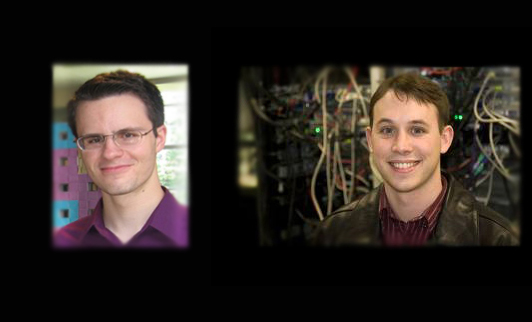
The CSE Colloquium series will host two faculty candidates: Cody Dunne of the University of Maryland will speak on March 7 about "Measuring and Improving the Readability of Network Visualizations" and Tim Weninger of the University of Illinois Urbana-Champaign will speak on March 12 about "Discovering Roles and Types through Hierarchical Information Network Analysis ", both at 4 p.m. with receptions at 3:30 p.m.
Dunne's Abstract
Network data structures have been used extensively in recent years for modeling entities and their ties for many diverse disciplines. Analyzing networks involves understanding the complex relationships between entities as well as any attributes, statistics, or groupings associated with them. The omni- present node-link visualization excels at showing network topology and features simultaneously, but many node-link visualizations are not easily read- able or difficult to extract meaning from because of inherent network complexity or size. Moreover, for every network there are many potential unintel- ligible or even misleading drawings. In this talk we discuss strategies to help users create more effective node-link visualizations in NodeXL, as well as a novel alternate network visualization technique called GraphTrail. We first detail readability metrics to quantify the effectiveness of node-link visualiza- tions, localize areas needing improvement, and feed into assistive layout tools. Next, we introduce a technique called motif simplification that leverages the repeating patterns or motifs in a network to reduce visual complexity and increase readability. We then discuss meta-layout algorithms that take attribute- or topology-based groupings into account, so as to more clearly show the ties within groups and the aggregate relationships between groups. Moving beyond node-link visualizations, we turn to GraphTrail, a technique for analyzing networks through exploration of node and edge aggregates. GraphTrail captures users’ interactions and integrates this history directly in the exploration workspace, which improves exploration recall and sharing of analyses with others.
Biography
Dunne is a PhD student and graduate research assistant at the University of Maryland, College Park. His interests lie primarily in human computer interaction, specifically information visualization and graph/network drawing (my portfolio). His advisor is Ben Shneiderman and he is a member of the UMD Human-Computer Interaction Lab (HCIL).
Weninger's Abstract
Graphs are all around us. They can be made to model countless real-world phenomena ranging from the social to the scientific including engineering, biology, chemistry, medical systems, and e-commerce systems. We call these graphs information networks because they represent bits of information and their relationships. This talk focuses on discovering roles and types in very large scale information networks by exploring hierarchies inherent within the networks. We focus on the Web-information network, as well as specialized sub-networks like Wikipedia, where we aim to determine the type of a Web page or Wiki page as well as its position in the type-hierarchy (e.g., professor, student, and course exists within a department within a college) and their relationships to each other. This new information can then used to answer expressive queries on the network and allows us to explore additional properties about thenetwork that were previously unknown.
Biography
Weninger is graduating from the Department of Computer Science at the University of Illinois Urbana-Champaign where he is a member of the DAIS group and the Data Mining Lab. His research interests are in large scale information network analysis, especially on the Web, as well as "big data"-bases, "big data"-mining, information retrieval and social media. Tim is a recipient of the National Defense Science and Engineering Graduate Fellowship (NDSEG) and the National Science Foundation Graduate Research Fellowship (NSF GRFP). He has been an invited speaker at many international venues and has served as a reviewer, external reviewer or PC member for dozens of international journals, conferences and workshops.